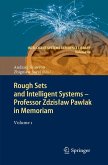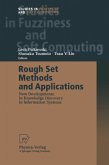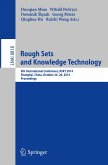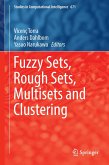This book is dedicated to the memory of Professor Zdzis{\l}aw Pawlak who passed away almost six year ago. He is the founder of the Polish school of Artificial Intelligence and one of the pioneers in Computer Engineering and Computer Science with worldwide influence. He was a truly great scientist, researcher, teacher and a human being.
This book prepared in two volumes contains more than 50 chapters. This demonstrates that the scientific approaches discovered by of Professor Zdzis{\l}aw Pawlak, especially the rough set approach as a tool for dealing with imperfect knowledge, are vivid and intensively explored by many researchers in many places throughout the world. The submitted papers prove that interest in rough set research is growing and is possible to see many new excellent results both on theoretical foundations and applications of rough sets alone or in combination with other approaches.
We are proud to offer the readers this book.
This book prepared in two volumes contains more than 50 chapters. This demonstrates that the scientific approaches discovered by of Professor Zdzis{\l}aw Pawlak, especially the rough set approach as a tool for dealing with imperfect knowledge, are vivid and intensively explored by many researchers in many places throughout the world. The submitted papers prove that interest in rough set research is growing and is possible to see many new excellent results both on theoretical foundations and applications of rough sets alone or in combination with other approaches.
We are proud to offer the readers this book.
From the reviews:
"This volume is the second of two volumes of papers published in his memory after his death in 2006. It contains 30 papers covering theory and the application of rough sets contributed by colleagues, former students, and collaborators around the world. ... Each of the chapters has its own list of references. The style of writing is at a very sophisticated level. ... this volume is written for specialists in the theory and applications of rough sets." (Anthony J. Duben, ACM Computing Reviews, January, 2013)
"This volume is the second of two volumes of papers published in his memory after his death in 2006. It contains 30 papers covering theory and the application of rough sets contributed by colleagues, former students, and collaborators around the world. ... Each of the chapters has its own list of references. The style of writing is at a very sophisticated level. ... this volume is written for specialists in the theory and applications of rough sets." (Anthony J. Duben, ACM Computing Reviews, January, 2013)









